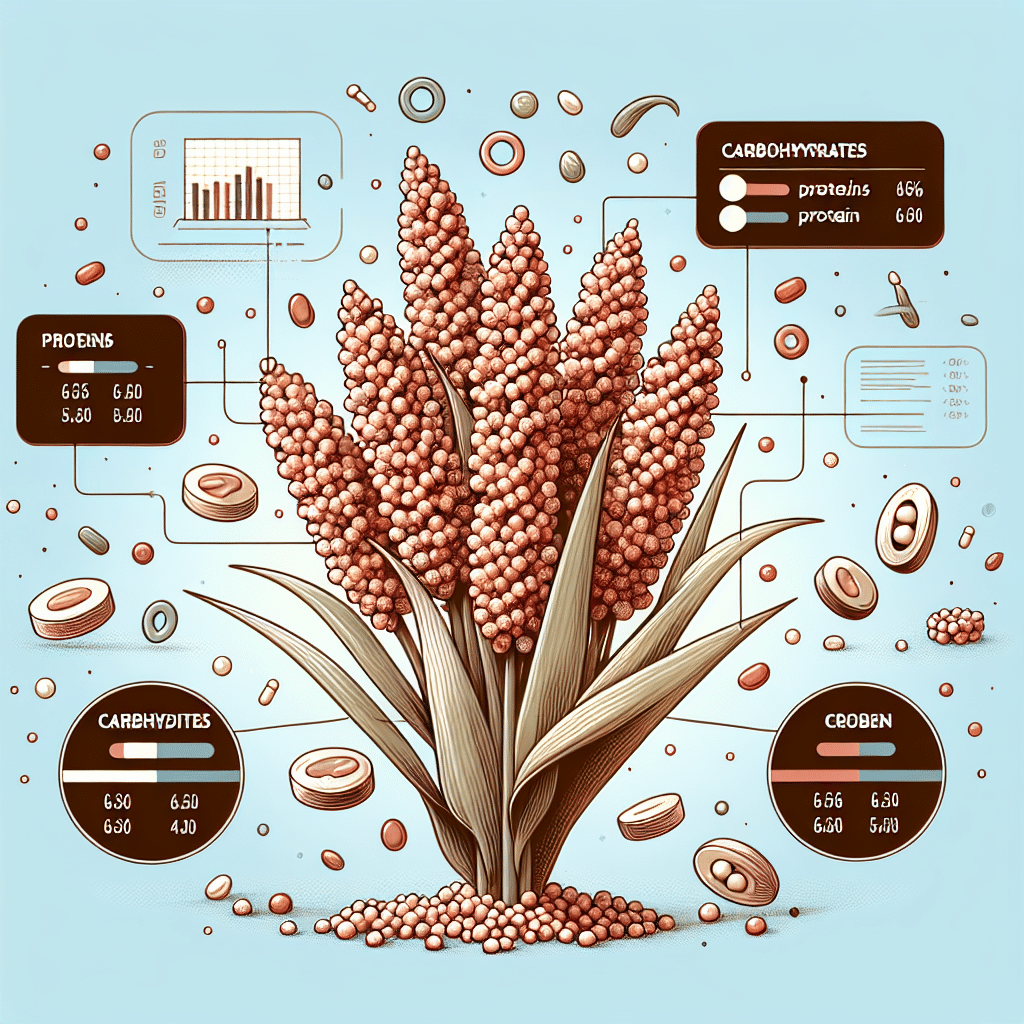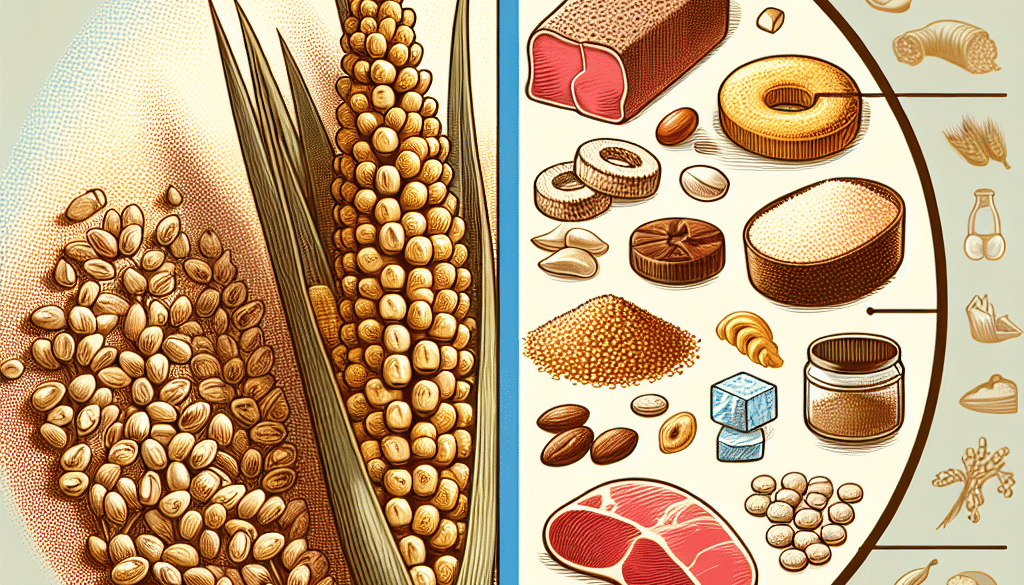Is Sorghum A Protein Or Carbohydrate?
-
Table of Contents
- Sorghum: Understanding Its Nutritional Profile as a Protein and Carbohydrate Source
- What is Sorghum?
- Nutritional Composition of Sorghum
- Sorghum as a Carbohydrate Source
- Sorghum as a Protein Source
- Health Benefits of Sorghum
- Uses of Sorghum in Food and Industry
- Case Studies and Statistics
- Conclusion: A Balanced Source of Nutrients
- Discover ETprotein’s High-Quality Protein Products
Sorghum: Understanding Its Nutritional Profile as a Protein and Carbohydrate Source

Sorghum, a versatile grain that has been a staple food in many parts of the world, particularly in Africa and Asia, has gained increased attention in recent years. This ancient cereal is not only drought-resistant but also comes with a host of nutritional benefits, making it an excellent crop for arid regions and a valuable addition to the global food supply. In this article, we delve into the composition of sorghum to understand whether it is primarily a protein or carbohydrate source and explore its health benefits and applications.
What is Sorghum?
Sorghum, scientifically known as Sorghum bicolor, is a cereal grain that belongs to the grass family Poaceae. It is the fifth most produced cereal worldwide, after wheat, rice, maize, and barley. Sorghum is prized for its resilience to harsh weather conditions and its versatility, as it can be used for food, fodder, and biofuel production.
Nutritional Composition of Sorghum
To understand whether sorghum is a protein or carbohydrate, it’s essential to look at its nutritional makeup. Sorghum is rich in various nutrients, including:
- Carbohydrates
- Proteins
- Fiber
- Vitamins (such as B vitamins)
- Minerals (including phosphorus, potassium, and iron)
- Phytochemicals (such as phenolic compounds and antioxidants)
Carbohydrates are the primary energy source in sorghum, making up the bulk of the grain’s caloric content. However, sorghum also contains a significant amount of protein, which contributes to its nutritional value.
Sorghum as a Carbohydrate Source
Sorghum is predominantly a carbohydrate, with the majority of its calories coming from starch. The carbohydrate content in sorghum can vary but typically ranges from 70 to 80 percent of its dry weight. The starch in sorghum is a complex carbohydrate, which means it provides a slow and steady release of energy, making it beneficial for blood sugar control.
Sorghum as a Protein Source
While sorghum is primarily a carbohydrate, it also contains a notable amount of protein. The protein content in sorghum can range from 9 to 12 percent of its dry weight, depending on the variety and growing conditions. Sorghum protein is particularly interesting because it is gluten-free, making it a suitable grain for those with celiac disease or gluten sensitivities.
Health Benefits of Sorghum
Sorghum offers several health benefits, including:
- Gluten-Free: As mentioned, sorghum is naturally gluten-free, making it a safe grain for individuals with gluten intolerance or celiac disease.
- Rich in Antioxidants: Sorghum is high in antioxidants, which help protect the body against oxidative stress and may reduce the risk of chronic diseases.
- Supports Digestive Health: The high fiber content in sorghum aids in digestion and can help prevent constipation.
- May Help Control Blood Sugar: The complex carbohydrates in sorghum have a lower glycemic index, which can help manage blood sugar levels.
- Heart Health: The presence of fiber, potassium, and phytochemicals in sorghum can contribute to cardiovascular health.
Uses of Sorghum in Food and Industry
Sorghum is used in various ways, both in the kitchen and in industry:
- Food Products: Sorghum can be consumed whole, cracked, or ground into flour. It is used in bread, porridges, snacks, and even beverages like sorghum beer.
- Animal Feed: Sorghum is a common ingredient in livestock feed due to its nutritional content and digestibility.
- Biofuel Production: The grain’s high starch content makes it an excellent source for biofuel production, particularly ethanol.
Case Studies and Statistics
Research has shown that incorporating sorghum into diets can have positive health outcomes. For instance, a study published in the “Journal of Nutrition and Metabolism” found that sorghum bread improved glucose and insulin responses in individuals with type 2 diabetes. Additionally, the United Nations Food and Agriculture Organization (FAO) reports that sorghum production has been steadily increasing, highlighting its growing importance as a global food source.
Conclusion: A Balanced Source of Nutrients
In conclusion, sorghum is both a carbohydrate and a protein, with its primary nutrient being carbohydrates. Its balanced nutritional profile, including its protein content, makes it a valuable grain for human consumption. Sorghum’s versatility and health benefits further enhance its appeal as a dietary staple and industrial crop.
Discover ETprotein’s High-Quality Protein Products
If you’re looking for high-quality protein sources, consider ETprotein’s range of organic bulk vegan proteins. ETprotein specializes in producing and supplying a variety of plant-based proteins, including rice, pea, and seed proteins, which are non-GMO, allergen-free, and feature a neutral taste. These proteins are ideal for various industries, from nutraceuticals to food and beverage manufacturing.
About ETprotein:
ETprotein, a reputable protein and L-(+)-Ergothioneine (EGT) Chinese factory manufacturer and supplier, is renowned for producing, stocking, exporting, and delivering the highest quality organic bulk vegan proteins and L-(+)-Ergothioneine. They include Organic rice protein, clear rice protein, pea protein, clear pea protein, watermelon seed protein, pumpkin seed protein, sunflower seed protein, mung bean protein, peanut protein, and L-(+)-Ergothioneine EGT Pharmaceutical grade, L-(+)-Ergothioneine EGT food grade, L-(+)-Ergothioneine EGT cosmetic grade, L-(+)-Ergothioneine EGT reference grade and L-(+)-Ergothioneine EGT standard. Their offerings, characterized by a neutral taste, non-GMO, allergen-free attributes, with L-(+)-Ergothioneine purity over 98%, 99%, cater to a diverse range of industries. They serve nutraceutical, pharmaceutical, cosmeceutical, veterinary, as well as food and beverage finished product distributors, traders, and manufacturers across Europe, USA, Canada, Australia, Thailand, Japan, Korea, Brazil, and Chile, among others.
ETprotein specialization includes exporting and delivering tailor-made protein powder and finished nutritional supplements. Their extensive product range covers sectors like Food and Beverage, Sports Nutrition, Weight Management, Dietary Supplements, Health and Wellness Products, and Infant Formula, ensuring comprehensive solutions to meet all your protein needs.
As a trusted company by leading global food and beverage brands and Fortune 500 companies, ETprotein reinforces China’s reputation in the global arena. For more information or to sample their products, please contact them and email sales(at)ETprotein.com today.












